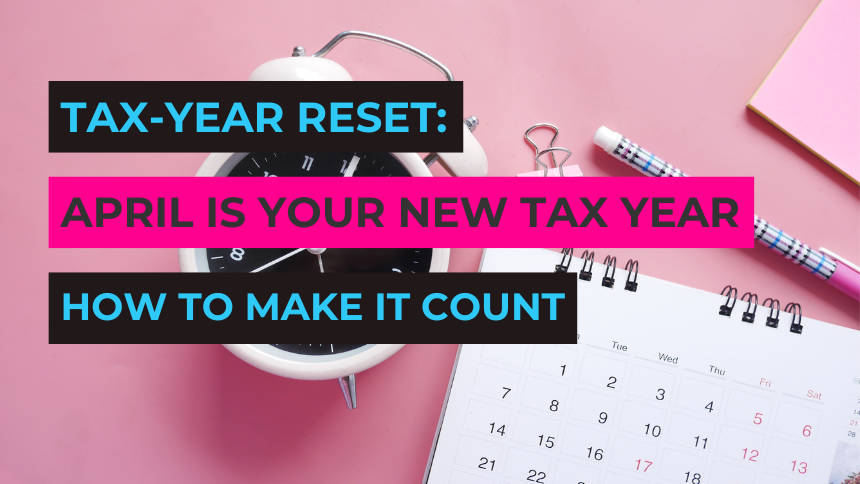
For small business owners in the UK, the end of the financial year on 5 April 2025 is more than just a deadline, it’s an opportunity to have a fresh start, plan smarter, and take control of your finances.
Think of it like a “New Year, New Me” moment for your business – April is your chance to make this tax year more profitable, more organised, and, of course, more stress-free.
Whether you’re a sole trader, limited company director, or freelancer, getting your self-assessment accounts in order early can make the world of difference.
In this blog, we break down what the tax-year reset really means, how to capitalise on it, and provide an easy-to-follow action plan to get ahead.
We’re here to make this your smoothest (and most financially successful) year yet.
The UK tax year runs from 6 April to 5 April the following year. This means the moment you wake up on 06 April 2025, you’re officially in a brand new financial year.
But here’s the thing: what you do in these early days sets the tone for the rest of the year. From organising your receipts to forecasting your profits, April is your chance to hit the refresh button and get proactive about your finances.
Why it’s important:
Now that you know why it matters, let’s talk about what you should actually do.
Here’s a practical strategy to help you take control from Day 1 of the new tax year:
✅ Step 1: Review Last Year’s Finances Start by reflecting on your previous tax year. Pull up your profit and loss statement, check your cash flow, and revisit your biggest wins (and losses).
Ask yourself:
✅ Step 2: Get Your Self-Assessment Accounts Up to Date We know it’s tempting to put this off until later in the year, but tackling your self-assessment accounts early is a life saver. Get your records in shape now, so future-you aren’t crying into receipts, paperwork and looking at an empty bank account come January.
Use cloud-based tools like FreshPay, QuickBooks, or Xero to automate categorisation and receipt tracking. The earlier your records are clean, the more accurate your tax planning can be.
✅ Step 3: Set Financial Goals for the Year
Think beyond just surviving. What would a successful tax year look like for your business? It could be anything – from increasing turnover by 20% to reducing expenses by 15%, or even hiring a part-time staff member by September.
✅ Step 4: Plan for Tax from the Start
Don’t wait until you’ve got a tax bill to start saving for it. Create a dedicated tax savings pot and contribute to it monthly. A good rule of thumb is to set aside 20-30% of your profits if you’re a sole trader.
✅ Step 5: Speak to Your Accountant
You don’t have to do this alone. Now is the perfect time to schedule a planning session with your accountant. Ask them to review your self-assessment accounts, help you set up cash flow forecasts, and improve your tax position from the get-go. (if you’re looking for extra support, reach out to a member of our team).
Let’s be honest. We’ve seen a few too many businesses get caught out by these classic mistakes:
❌ Waiting Until January to File Waiting until the self-assessment deadline means you’re working off old numbers, missing out on real-time decisions, and risking errors. Trust me, the January rush is the least fun you’ll ever have.
❌ Not Logging Income Properly If you’re still jotting income down in a notes app, it’s time to upgrade. Accurate records are the foundation of your self-assessment accounts. Plus with MTD for ITSA on it’s way, you soon won’t have a choice.
❌ Ignoring Business Goals A new tax year isn’t just about compliance – it’s about growth. If you’re not setting business goals, you’re missing a huge opportunity to scale smarter.
If you’re still tracking everything manually, you’re working harder than you need to. Here are a few tools our clients love:
Using tools like these will also help make your self-assessment accounts way easier to compile (and much more accurate).
The Numbers Quarter aren’t just here to submit your tax return, we’re here to help you plan, grow and protect your business.
Working with an accountant in April means:
Many business owners think they only need us once a year. But the most successful ones? They check in before the year even gets going.
A new tax year is a fresh start—but only if you treat it that way. Don’t drag bad habits, messy records, or wishful thinking into another financial year.
Instead, use this moment to:
Need help getting started?
TNQ helps UK businesses like yours start strong and stay ahead. Book your free financial year planning call today or sign up to our mailing list and let’s make 2025 your most financially successful year yet.